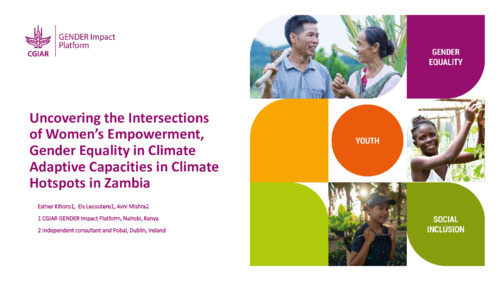Uncovering the Intersections of Women’s Empowerment, Gender Equality in Climate Adaptive Capacities in Climate Hotspots in Zambia
Abstract
Women in agri-food systems in low- and middleincome countries are more likely than men to be adversely affected by climate change. They also have more limited adaptive and resilience capacities due to socioeconomic and cultural factors, including restricted access to resources, information, discriminatory gender norms, and limited decision-making power. This study tests hypotheses derived from gendered food-systems frameworks. It examines the extent to which women’s empowerment in the household is associated with intrahousehold gender equality in access, knowledge and adoption of climate-smart practices in contexts experiencing significant climate change hazards and stressors. It also explores the strength of the association of different dimensions of women’s empowerment with gender equality in access, knowledge and adoption of climate-smart practices. The study uses genderdisaggregated intrahousehold data from 199 dual households in climate–agriculture–gender hotspot areas of Zambia. The results provide some support for the hypothesis of a positive association between women’s empowerment and intrahousehold gender equality in climate-smart climate resilience capacities, more specifically access to technical advice on climatesmart agriculture. The results support the hypothesis that different dimensions of women’s empowerment— norms, intrinsic, instrumental, and collective agency— are differentially associated with intrahousehold gender equality in climate-resilience capacities. The findings highlight the complexity of the relationships between women’s empowerment and gender equality in climate-resilience capacities in climate hotspots, emphasizing the need for context-specific analyses.

